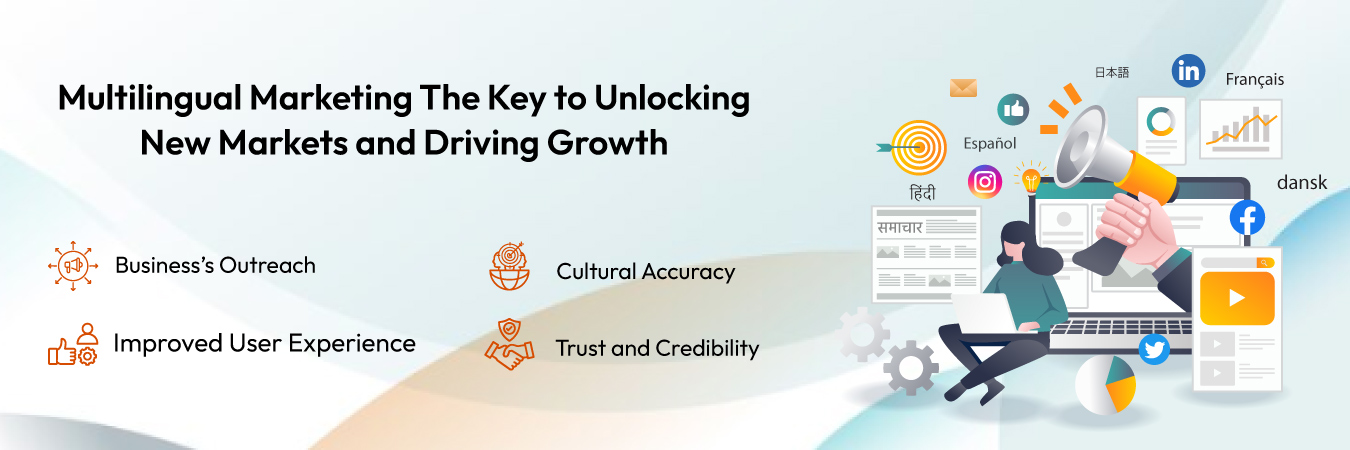
Multilingual Marketing: The Key to Unlocking New Markets and Driving Growth
Marketing has undergone a paradigm shift in recent years. Earlier, it had a restricted scope and rarely ventured beyond the conventional formulae. However, lately, it has morphed into something different and even better. One of the most significant aspects of this evolved form of marketing and also the cornerstone of the marketing success of many businesses is multilingual marketing.
With the rise of local languages and considering language as an effective medium, multilingual marketing has become a significant element of every marketing campaign. It helps companies unlock new markets and drive business growth. If you’ve been looking to do that, you’ve come to the right place. Here’s how multilingual marketing can unlock the doors to global success.
What is Multilingual Marketing?
Multilingual marketing involves creating and implementing marketing strategies and campaigns in different languages. The marketing strategy intends to increase a business’s outreach and serve diverse linguistic preferences.
So, is multilingual marketing merely translating a campaign? No. Of course, translation is part of multilingual marketing. But the marketing strategy goes beyond translation. It involves cultural adaptation and localization to communicate in a way that resonates with the respective target audiences.
Multilingual marketing requires employing multilingual marketing experts who drive the campaigns effectively by ensuring cultural, linguistic and contextual accuracy. These efforts translate into various benefits for a particular business. Here are six advantages that make multilingual marketing a must.
Transcending Geographies with a Multilingual Marketing Strategy – 6 Factors No Business Can Ignore!
Globalization is on the cards of every business. Given the ambition to go global, here’s why businesses should integrate multilingual marketing into their overall business communication and outreach strategy.
1. Broadening a Business’s Outreach
Marketing aims to widen a business’s outreach – it means taking its offerings to as many people as possible. Multilingual marketing helps amplify the marketing impact. How? It involves creating marketing campaigns in different languages and localizing them to make them more resonating. It enables businesses to tap into markets speaking different languages and a diverse audience base.
The outcome is a much wider outreach and higher potential for opportunities! Companies not only penetrate a particular market through consistent multilingual marketing efforts but also take their businesses to horizons that they once felt inaccessible or unconquerable.
2. Improved User Experience
These days, markets accept outsider brands only when convinced about their proposition, a part of which, apart from its offerings, is the user or customer experience. Going multilingual helps here. Providing customer service and localizing the website and product information in the local language helps improve the user experience. These initiatives drive informed decisions and lay the foundation for a fruitful and lasting journey.
3. Cultural Accuracy
Multilingual marketing also involves customizing marketing campaigns and communication to engage with diverse cultural contexts. Crafting a particular message to make it culturally appropriate delivers better returns in the long run. It is because the marketing campaign that values cultural nuances and implications usually turns out to be more effective (of course with other elements done correctly as well). It can bear fruits in the form of increased trust, credibility, and business opportunities.
4. Building Trust and Credibility
That’s precisely the next point. No business, no matter how big elsewhere, can expect to accomplish record-breaking sales in a new market in its initial stages. That’s because trust plays a significant role in driving opportunities and sales. People never buy anything from a brand until they trust it fully. Language proves a vital aspect here, as it can work as one of the key enablers of trust in new markets.
For instance, a French brand speaking English in a Thai market will never be able to engage with people as effectively. It will have to do what it takes to connect and win people’s trust– speak Thai. Doing so can help it yield more fruitful results in the form of trust and credibility.
5. Competitive Advantage
Multilingual marketing refers to walking the extra mile for your target audience and making them feel comfortable while interacting with the brand. For example, in a non-English market, who do you think will have a competitive edge here? A fully English website with English customer support or a localized website with a multilingual chatbot or customer care. Of course, the answer is obvious! Multilingual marketing helps companies gain a competitive edge over their unilingual competitors. People who prefer communicating in their native language (who are larger in numbers than English-speaking ones) typically connect with multilingual brands and tend to stay loyal.
6. SEO Advantage
One cannot discount SEO while discussing multilingual marketing, especially in the context of unearthing opportunities across new markets. Using local phrases, words, important local language keywords, popular trending terms, etc., in the website, mobile app, or social media campaign is part of multilingual marketing. It helps increase visibility for local search terms. The result would be better search engine rankings and more traffic generated from the local audience.
Going multilingual is a strategy that needs expert and professional multilingual marketing services. Filose, a leading company in the localization space, can serve that need. With over a decade of experience in localization for multiple languages, diverse markets and different businesses, Filose proves itself a worthwhile choice for multilingual marketing. Email us at sales@filose.com to explore more about our multilingual marketing strategy and services.
Ref. No – FLB04241054
